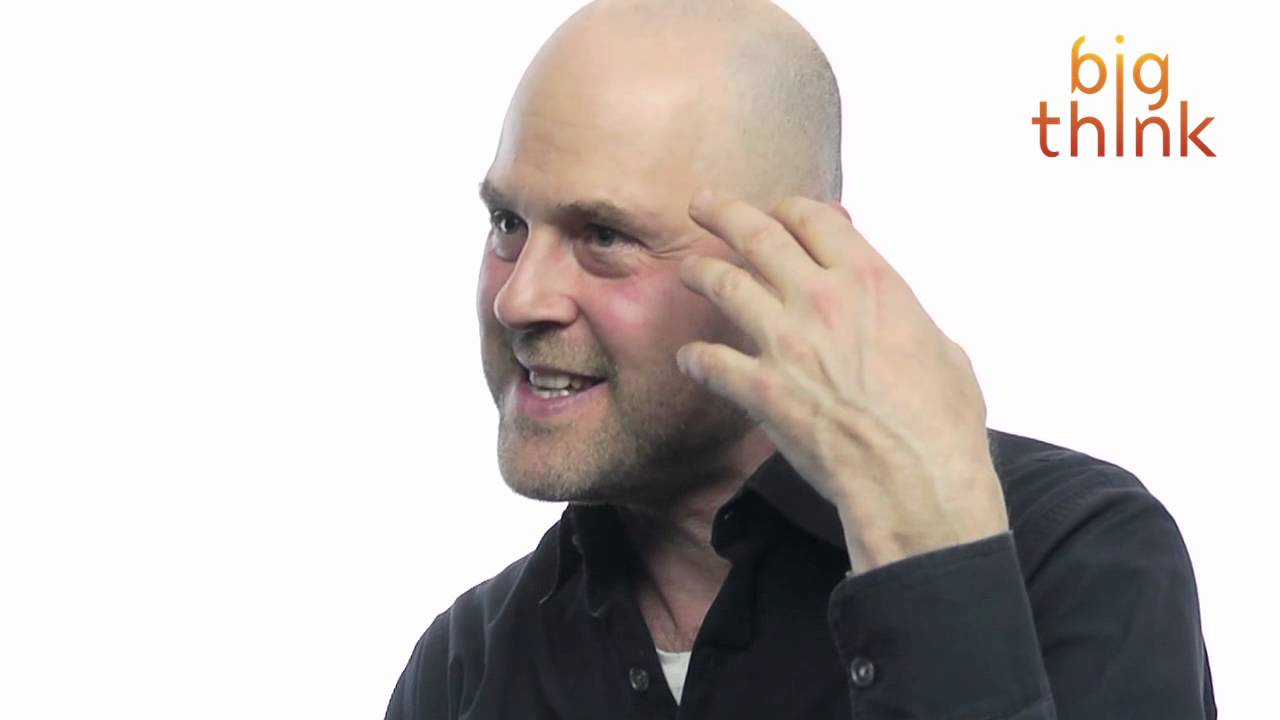Big Think
Isaac Newton defined the optical spectrum, but it was Goethe who first understood that color is more than just a physical problem. In Theory of Colours (1840), the German writer and painter examined phenomena like colored shadows, refraction, and chromatic aberration, as well as the psychology of color, “marvelling at color’s occurrences and meanings” and hoping to uncover its secrets. His great insight: color vision is shaped as much by human perception as it is by mechanical functioning.
He was a man of poetic sensibilities. He was also right. Today, neuroscientists believe that your eye doesn’t see color at all — your brain creates it and constructs it through neural processes. Different features including color, shape, location, and velocity are picked up by different regions of the brain and then integrated into a holistic perception of an object.
“This is a wonderful area where both science and philosophy have tended to really collaborate, have been in dialogue with each other. In many cases the leading philosophers have also been the leading scientists thinking about this,” says the philosopher Alva Noë, a former fellow of the Oxford Centre for Cognitive Neuroscience.
Directed / Produced by
Jonathan Fowler and Elizabeth Rodd
Alva Noe: You know a funny thing about the contemporary neuroscience of consciousness is it’s really closet philosophy. It’s really it’s very often making fundamental philosophical assumptions. That is to say it’s taking certain philosophical ideas for granted and it’s often using empirical information simply to reanimate old debates. For example, one of the basic sort of guiding pictures I think that people thinking about the neuroscience of consciousness have is that the world is in our head The brain makes the world, that is what we experience is not—I don’t experience you. I don’t see you. I experience something in my brain that is confabulated on the basis of a pattern of stimulation.
Let me come to the nature of color as an example to try to illustrate what I have in mind. And by the way this is a wonderful area where both science and philosophy have tended to really collaborate, have been in dialogue with each other and in many cases the leading philosophers have also been the leading scientists thinking about this. One view is that color is a property of the surfaces of objects, not the property we naively think we see, but maybe something like a disposition to absorb and reflect light of certain wavelengths and to produce a sort of what is known as a spectral reflectance profile, but the color is on the surface. Another view is that it’s an illusion to think of color as something in the thing, that color is merely an affect that the thing has on us. In that sense the color happens to us. The leaves in the tree are not green. Greenness is just something that happens. In me it’s a kind of sensation that is produced thanks to the activation of my nervous system by those leaves.
My own view is that both of those views are wrong. I advocate the view that color is what you might call an ecological property and by that I mean color is a feature of the way light and surfaces interact. It’s not in that sense intrinsic to the surface of the leaf that it is green. Its greenness is the way it behaves in relation to lighting. So we think of the color as stable, but of course the color looks one way under one light and if you take it outside it looks different and if you turn it in certain ways there will be highlights and sort of little specular shining points on the surfaces of things that are all part of the real color of the thing. For me colors are like shapes. Just as a three-dimensional shape has a hidden backside so colors have hidden ways they would look if the conditions of lighting were changed.
The problem of skepticism about the external world, how do we know that things are the way they seem to be, how do we know that our perceptual experiences are reliable is a chestnut. It’s an old philosophical chestnut that I can’t solve for you right now and that neuroscience can’t solve, but what I’d like to impress on you is that neuroscience has taken a solution to that or at least an attitude towards that old philosophical chestnut for granted and most neuroscientists working on consciousness suppose experience is something that happens inside of me. It’s subjective. It’s hidden. The world is this we know not what which is beyond the surfaces of our tent. Beyond the reach of our direct knowledge because all we ever know is the way our nervous system is bombarded by stimulation, that which is causing the stimulation is always beyond us.
Directed / Produced byJonathan Fowler & Elizabeth Rodd
Source




White = normal black = bad
Well, no. It's not about sensitivity… Either you "Get" the colour or you don't. Maybe you "get" a less amout of it, but that would mean that you see everyting a litte dimmer.
You may be interested in colour blindness. Let's say we lack the L-cones (most common type)… We wouldn't be able to see green at all. What is green for you, may be yellow for me.
Therefore, i consider the 3 views of colour correct. An spectrum, a sensation and a relation.
I like this quandary but Noe's stance on it really isn't "option C", it's just a more informed version of the one in which objects have intrinsic coloring – and since all of the sciences go by the most informed version of the facts, it is EXACTLY the first view. Color is an experience resulting from quanta of energy interacting biologically with a conscious perceiver.Energy is invisible.Color does not exist until a mind does – a specific kind of mind at that. Light itself doesn't hit your brain.
A lot of you are missing the point. This isn't about how the frequencies and energy levels of light are altered nor is it about biological differences altering perception. It is about the very experience of color. Whether it be from an outer source or mental visualization. Maybe if you poke a photoreceptive cell "red" happens.The real issue here is this:Our universe is composed of different things striking and interacting with other things.One of those impacts makes "green" happen.It's odd.
hah! from ur profile pic , id say your a koan sound fan. awesome to see you here in the other side of youtube 🙂
color is in the surface
That's exactly what I was wondering. Or you can go extreme and say like maybe our brain was wired different or something IDK but anyways what if to me all colors were like rearranged, like red was blue and yellow was green. To me I'd see forests as yellow, camoflauge as yellow, but I'd still know it as green. Would anyone be able to tell? Would I be able to tell?
Or what I mean to ask is, would I be able to figure out that the green I saw was actually yellow, or am I just high and this is a stupid pointless question?
color is energy.
look up colourblindness
Google Qualia
What the fuck is this guy talking about? Philosophy is dead, move on.
Colour is a perception, of wavelengths of light. That's not a really one of a few theories, that's the theory.
Dude just blew my fucking mind… or it could be this pot
Just look at his name. David Crowder is a jesus band. Clearly his faith is subconsciously causing him to reject any kind of scientific or philosophical reasoning that doesn't involve his/her god. Some people really thing "god" is the answer to everything. If this were true, I would have aced my algebra 2 final in high school when I wrote in god for every answer and proof.
As far as I know philosophy, the "love of wisdom", is still here and strong.
Science itself has a philosophy and there are a lot of "lovers of wisdom" out there.
You can identify them by the Ph (from philosophy) in their Ph.D.
Science is sad sometimes. Our world is the colorless and ugly peace of shit in reality. My life makes no sense anymore. Fucking illusions.
i've been asking myself the question "do i perceive the world like other people do?" since i was 14 years old.10 years past and i still don't have a clue…
I think the problem with this discussion is that when we think:
1. "when our brain and the environment intraract we experience color"
we actually say:
2. "colors aren't real, they are only impressions".
So we involve emotional triggers into the argument with words like "real" (evoking positive emotions) and "only" (ev. negative emotions), while we should hold on to facts if we wan't it to stay scientific and logical.
/watch?v=evQsOFQju08
Watch that and maybe you will have a clue.
seen it, thanks 🙂
Oh he's a former fellow of the Oxford Centre…. I wonder why!
he is not arguing what color is, he's arguing how we perceive these wavelengths of light that is called color
provide scientific evidence for what? everything he said is already supported by scientific evidence
It's not absolute crap nitwit. He spoke science and factually. Color, like anything else in life, cannot be pin pointed. It is always a reaction of many things that happen at one point in time and is constantly changing.
So before you make a dumb, derogatory comment, check your facts.
When you are painting, or deciding on creating a strong color palette. You need to study how light interacts with an object.
If you don't believe this guy. Take any picture and convert it to black and white. You'll get values and how light reacts, basically.
I'm still learning this.
I think that color is completely created in our minds. This is because only a small amount of the full electromagnetic spectrum is visible to us. Wavelengths such as ultraviolet and Infrared are not visible to us, but are visible to some other species, meaning all of the colors that we see are not all of the colors that could exist. Green as we see it could be different than how a butterfly sees it, and neither green is wrong.
wikipedia – Phaneron
How the electrical signal encoding a colour in our nerves to brain is then transformed into the perception of greenness say is utterly unknown. It hints that there is a new realm of scientific discovery to be investigated. It is time to move beyond the prison of the senses.
this is silly
The interesting part of this to me is that is suggests a deeper truth of evolution. Yes, part of what we think of as color is 'in the world' and part is 'in our head' (so to speak). And part of it is also probably between the two in some way that is very difficult – but I think not impossible – to understand.
This guy is fucking retarded. We know exactly what light is, its frequencies, and why things absorb certain frequencies and reflect others. We know how our eyeballs work, how our retinas work and the optic nerve works.
I suppose that doesn't help you sound mysterious and pick up chicks in college though.
This guy is amazing. I think we are coming closer to answering that old philosophical chestnut. We just have to keep searching and questioning.
Noe is very good at making thoughtful-looking facial expressions.
The great absurdity of this whole argument of "we cannot know the world beyond the impressions of our sensory systems" is that it equally applies to our knowledge of these very sensory systems. It basically says that we cannot have knowledge about our sensory systems because we cannot have knowledge about our sensory systems.
The argument is flawed.
hello . if the source is nuclear light , why wander about in a spectre colour illussion . . with regards
Eh,dear dudes.
This is a lot of mumbo jumbo,complicating simple things is not how science works,and neither does philosophy for that matter:).
Phylosophicaly,and scientificatly also,the world is in your brain,yes,thats true,all that you experience is not outside there in what you call "the outside world",it's inside your brain,BUT,at the same time what you call your brain is inside "the outside world":).Did this never strike you?:))you create the world and the world creates you,it's all just one continous proccess.Events,objects,"things" are all created by the human mind,as way to map "the outside world"(the same way meters map space,there are no "meters" in the real world 🙂 ),not realiseing that there is no real separation between you and the so called "outside world".Apparently philosophy didn't influence science enough yet,and biologists that study ecosistems and know that there is no individual without an environment and no environment without the individual are just to close minded to get the point:).
What is color?..uuu,so complicated thing this color :),lets find more and more complicated ways of describing an obvious thing,just so we can satisfy our Ego,not because we really want to understand how the world works.Why could't the explination that it is different spectrums and intensities of light(which in term is a form of energy that vibrates at certain frequencies) that stimutate the receptors in your brain suffice?I tell you why,because people think of this as an outside thing called "light" that does something to another thing called "brain" as to create another thing called "color"(which are simply ways in which we speak) and believe that this way of seeing it constitutes the ABSOLUTE real world:).This is how people create the separation between them and the world,and this is how the ilusion of the Ego is created.These are simply conventions of speach,invented so we can comunicate with each other,which is a great thing.
The problems arises when people simply cant recognize that this is so,they get deceived:).Such people will forever "chase their tail" until they die,in search of ghosts of reallity,transpositions of reality,ideas about reality,but never actual reality.
You simply have to look at a color with an open, non-conceptual mind,and you will understand what color is ;).
Sorry for the long post and bad english,i dont usually comment on stuff.
😉
its just a bunch of values.
Even though we don't understand a thing about consciousness that doesn't mean there is a "problem of the external world". There is an external world no matter what stance you take on the issue. Skeptical arguments like "Brain in Vat" or the "Simulation Hypothesis" are no more possible than a genie coming out of a lamp after rubbing it. Namely, the neurosynaptical interactions happening in the brain don't magically form any kind of conscious experience. Those informations could litterally mean anything, like a computer without a monitor. The elaborations inside the computer are meaningless without a monitor taking the inputs and constructing an actual image. I don't know what "monitor" is needed to form consciousness but I think it's the whole body. My whole argument, that is indisputable (unless you're crazy), completely refutes "external world skepticism". What remains is pure solipsism that should have been thrown away as soon as someone had thought about it. It's similar to the argument of the Genie coming out of nowhere by pure "magic". Nonsense.